A number of programs have been implemented over the years to acquaint the public with the Coronado Police Department (CPD). For example, the Senior Volunteer Patrol (SVP), ride alongs, and “Coffee with a Cop,” which allows residents to sit down with officers and share concerns. Police Chief Chuck Kaye says, “There are some insightful questions that keep us on our toes.” These programs have all been put on hold during the pandemic, but CPD is looking forward to reinstating them in the future to continue to connect with the community.
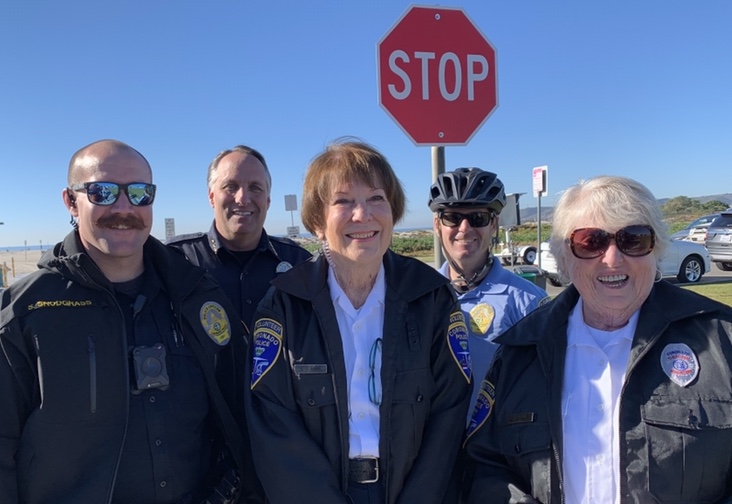
Not everyone knows they want to be a police officer when they grow up. Sometimes people know at a young age because of an experience they have had, others join because it is a family calling, or still others like Chief Kaye are headed in a different direction when they find their path to law enforcement and know it’s what they were meant to do. He speaks highly of CPD’s dedicated staff and the role they play in keeping the community safe, and says, “We police based on community expectations.”
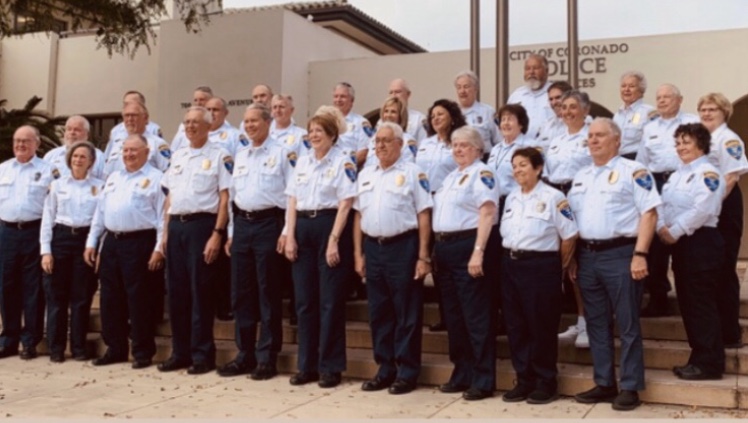
Carol Pastor Shares Highlights of the Senior Volunteer Patrol
The Senior Volunteer Patrol is an integral part of the Coronado Police Department. “I enjoy being involved and looking out for the safety of my community,” says Carol Pastor, SVP Board Member. While taking her driver’s education update 14 years ago, her instructor suggested she check out the SVP as a good way to give back and fill her time. After going on a ride along and completing classroom training, she was given a uniform and was ready to go. Now, she puts in about 300 hours a year, is on the board and helps teach the SVP academy.
Pastor gives a lot of credit to John Meyers who is in charge of the program and puts in about 1,000 hours yearly. It is incredible to note that the 40 members of the SVP donate between 8,000 and 10,000 hours per year. The SVP is on hiatus because of the pandemic, but the volunteers hope to be back on the streets soon.
The SVP program was started in 1995 by CPD Officer Kevin Shank. There were 18 members in his first class. Now, usually one academy is offered each year, with an average of seven to eight participants. Since its inception, SVP has had 140 volunteers, and Pastor is currently working on compiling bios of all of them.
To qualify to be an SVP member, applicants must be at least 50 years old; and the program boasts some members active in their late 80s. Some people join after they retire, and others still work part time while participating. SVP recruits are fingerprinted, background checked, and go through two weeks of classroom education, followed by four to six weeks of field training before they are ready to graduate from the academy and receive their badge. Consisting of 60 percent men and 40 percent women, SVP volunteers work four-hour shifts at least two times per month.
SVP members perform a variety of duties. “We are an extension of the eyes and ears of the CPD,” comments Pastor. From traffic control to warnings for parking violations, you’ll see them walking the business district on a regular basis to check in on businesses and see how things are going; and people often stop them to ask questions. They help with special events and are called to assist with directing traffic at accidents, fires, bridge incidents, hazardous waste spills, and other needs. Enforcing safety measures includes reminding kids to wear helmets while riding their bikes. Conducting scheduled house checks is also in their job description. Residents can schedule house checks for vacations for a period of up to 30 days, and SVP will come every morning and check doors, pick up newspapers, etc. Coronado SVP also work in the District Attorney’s office on a weekly basis.
After living in Coronado for more than 40 years, Pastor says that being part of SVP is a great way to stay active and loves that every day brings new challenges. She highlights, “We are fortunate to have the police department we do. If we see an incident, we call for back up and the CPD are there in a matter of minutes.” She did share her pet peeve and asks the community to “slow down, stay off their cell phones, and pay careful attention, especially with all the bike lanes.”
Her family was surprised when she first mentioned joining the SVP, but now her grandchildren proudly introduce her to their friends as an SVP cop, so her status has certainly risen. “We want to be welcoming, even if we have to tell you not to ride your bike on the sidewalk or to slow down,” she comments.
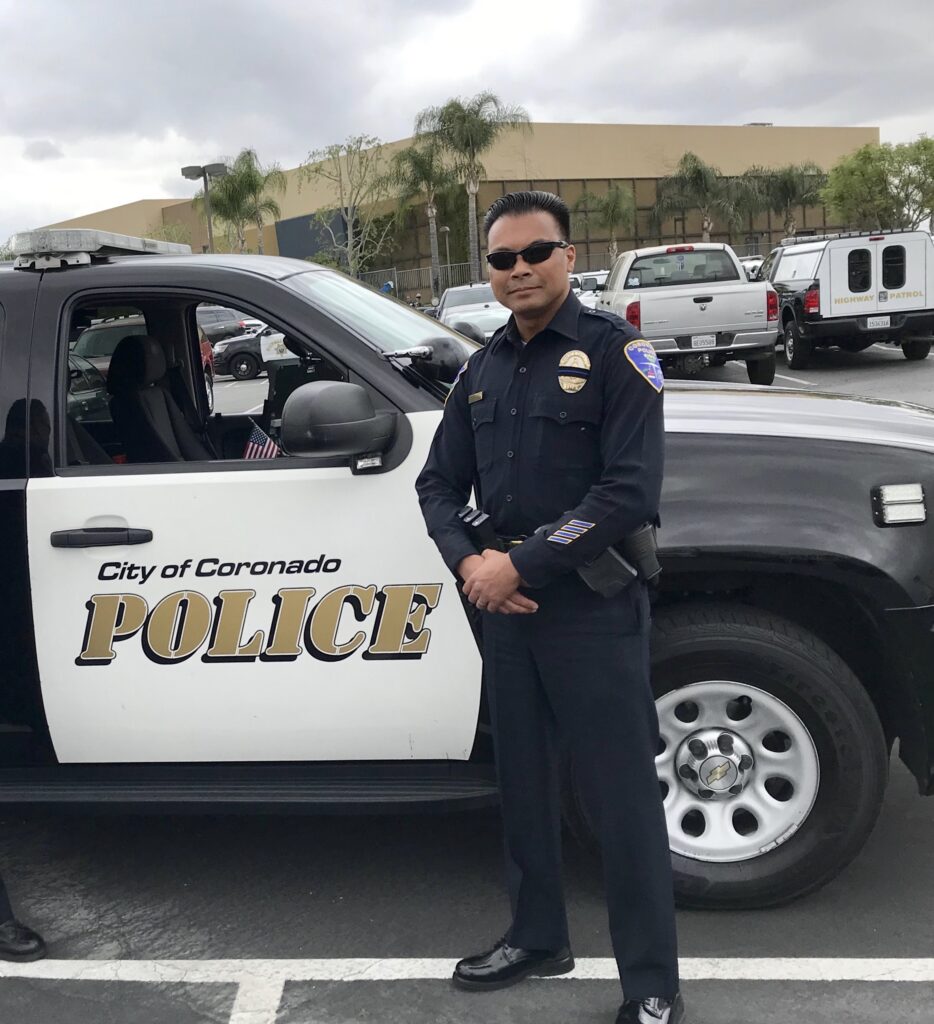
Officer Joey Tanglao: Together We Can Make a Difference for Tolerance
Even though he grew up in a Navy family, stationed in various bases around the world, Officer Joey Tanglao considers San Diego his home having moved here during his formative years. His Filipino heritage ingrained in him the desire to want to give back to the community in his profession, and he assumed he would follow in his father’s military footsteps. During college, the findings of the Christopher Commission, following the Rodney King incident and subsequent riots in Los Angeles, made him want to be part of law enforcement’s shift towards community policing and the multiculturism change with officer demographics better reflecting the communities they served. He chose to make a difference in his own community and joined the San Diego County Marshal’s Office. He has now been a familiar face with the CPD for 20 years.
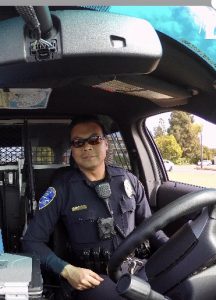
Tanglao enjoys his duties as a patrolman answering calls for service and being visible in the community. He likes connecting with people, investigating crimes, and seeing them to their conclusion. “Getting to know people in this small community and catching up on their family, business, and travels is rewarding. I like connecting with kids and make a point to say hello and wave,” he says.
When he first started in law enforcement, he says it was very much about the letter of the law and things were handled in very specific ways. He finds that the more you interact with people the more you can assess the situation. This is true with the recent health order for mask wearing and social distancing during the COVID-19 pandemic. He wears a mask for protection and finds that the way you deliver the message makes all the difference. He points out that the majority of people are compliant, when asked to wear a mask; but there are exceptions, such as walking down the street eating an ice cream cone, underlying health conditions, or being surrounded by family members, for example. He stresses, “It’s important to look at each individual circumstance.”
He believes that the military presence in Coronado and the many military families frequently moving in and out definitely contribute to how the community functions, and he hasn’t seen much racial discrimination for himself or others. He shares that the CPD receives mental health calls almost daily and says that number increased at the beginning of the pandemic, when people had little information and were uncertain. He’s been on patrol for numerous bridge suicide calls and says that it definitely affects the officers that respond.
Tanglao would encourage others to consider a law enforcement career. He personally joined in response to a nationwide call to embrace change after racial tensions, and has now seen it come full circle with the recent racial unrest. He believes “we can make a difference together for tolerance and understanding.”
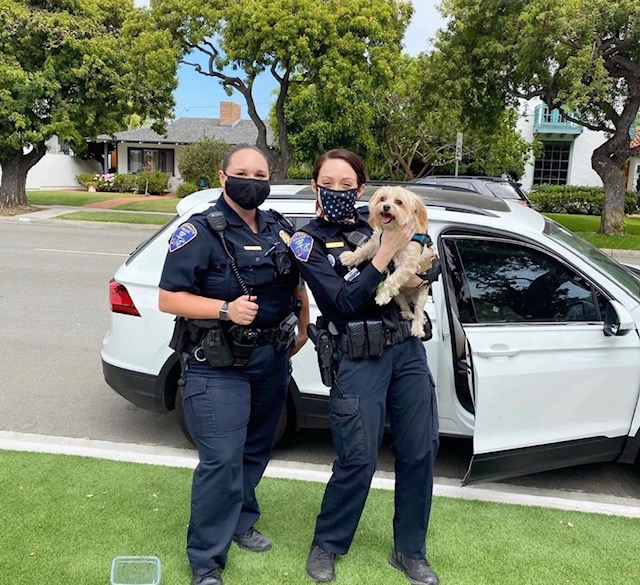
Officer Danielle Adams: Officers and People, We’re All Human
Coronado Police Officer Danielle Adams sees being a policewoman as a positive force and welcomes the chance to give back. Growing up in the South Bay, she worked for the National City Police Department (NCPD) for 12 years and has been with CPD for one and a half years. During her time with NCPD she was a field training officer, “De-escalation of Force” instructor, a school resource officer, a Psychiatric Emergency Response Team (PERT) Officer, a member of the Crisis Negotiation Team, a Police Explorer Advisor, held a position on the NCPD Police Officers Association Board, and had risen to the rank of Corporal. She also worked as a training officer for the Palomar Police Academy. At CPD, she is currently assigned to the patrol division, but is also a Field Training Officer, a Police Cadet Advisor, and the Secretary for the Police Officers Association.
As a patrol officer, she responds to radio calls which can be anything from a major crime, to a stolen bike, or an injured animal rescue. She in involved in emergencies, traffic investigations, cold cases (like finding stolen bikes) and crimes in progress. One of her favorite responsibilities is walking the business district; “I go wherever they need me to go and every day is different.” She enjoys day to day conversations with people and has met many interesting community members. “We are all human, we understand hurt and frustration, and we are happy to dialogue about anything. The only way we can solve problems is to talk together,” she points out.
Adams says that no call is too small for CPD and they receive calls for dogs off leash, wildlife rescue for sea lions, dogs, bats, possums, raccoons, bunnies, birds, and turtles, as well as thefts and violence.
She points out that people in Coronado are generally supportive of the police, although law enforcement has seen public frustration as the beach, parks and other things were shut down due to the COVID-19 pandemic. She noticed that people were compliant at first with the stay at home orders and then began pushing back more after the eight-week shutdown mark. “We understand the frustrations and that’s one of the reasons we have taken an educational approach to mask wearing and offer them if needed. I see about 75 percent compliance, which is higher than social media would lead you to believe,” she points out.
“Many people don’t stop to consider the emotional and mental toll it takes being a police officer. It’s hard for people to fully understand. Thankfully, CPD has good resources. We need to see each other as people not officer vs person. I appreciate that CPD has two police chaplains who rotate riding with officers and are available as an on-call resource when needed for both officers and the community,“ she comments.
Despite the way the media portray police officers, Adams emphasizes that it is an honorable profession. She feels that it is a calling and most people are in it for the right reasons. “As police officers, we realize how the public sometimes views us, but we are all human and while we have emotions and opinions on current issues and events, we have to enforce the rules to keep people safe.”
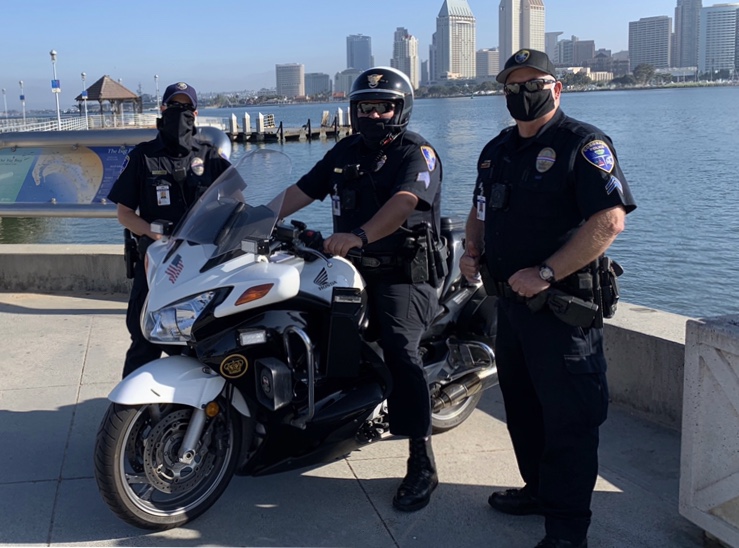
Sergeant Ralphy Garcia: Founded the Lt. Frank Greene Memorial Foundation
The road to law enforcement began at a young age for Sergeant Ralphy Garcia as he remembers watching police shows and knowing that’s what he wanted to do. Coming from the Imperial County Sheriff’s Department, he jokes that “I left the sand in the desert for the sand at the beach.” After 15 years with CPD, he has worked in various roles, including Motor Patrol, San Diego Narcotics Taskforce, Corporal Patrol Officer and Patrol Sergeant since 2017.
He highlights how much he appreciates the level at which CPD cares and offers educational opportunities for its employees. “The community here treats us well and we in turn try to do as much for them as possible. We will respond to any and every call. We are a hands-on department and regularly go to resident’s houses for a variety of requests.”
He has personally been called to dozens of suicide calls on the bridge. He was recognized by the mayor for personally saving two people he talked off the ledge. “It deeply affects all of us. I also offer peer support and reach out to officers to help them deal with the emotional toll it takes on all of us. We are given excellent training on how to handle these situations. CPD is way ahead of the curve compared to other agencies,” comments Garcia.
When asked how the COVID-19 pandemic has changed police duties, he highlights that the emphasis has shifted from enforcement to education. “We now spend a lot of time warning and educating the public on safety matters. We realize it’s difficult for the public to keep up with the changes, because it’s hard even for us. We strive for compliance, to protect everyone, and find people tend to obey if things are pointed out.”
In 2015 Garcia founded the Lt. Frank Greene Memorial Foundation, dedicated to honoring the life and memory of the only fallen hero who made the ultimate sacrifice in 1954 performing his duties while serving the City of Coronado. The foundation supports members of the CPD and their families and is also dedicated to helping local youth by awarding two yearly college scholarships and assisting young people in the City of Coronado’s Police Explorer Program.
Garcia would encourage others to be police officer, although there is certainly more risk now than when he started. “I’ve gotten a lot more out of my profession that I ever dreamed.”
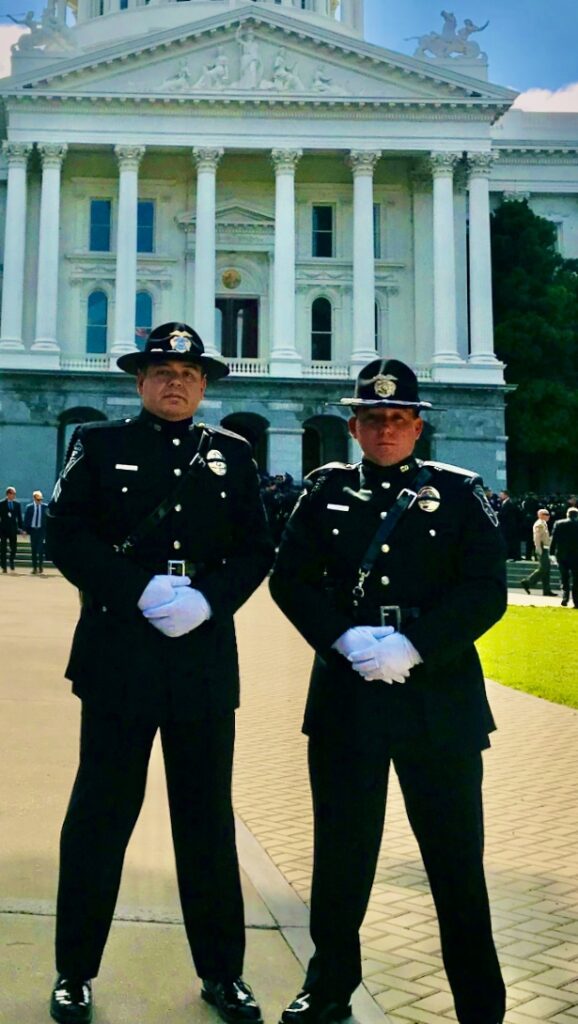
Related Articles in the Series:
Behind the Badge: A Series on the Coronado Police Department
Behind the Badge: CPD Training, Accountability, Statistics
Behind the Badge: The Impacts of the Bridge




